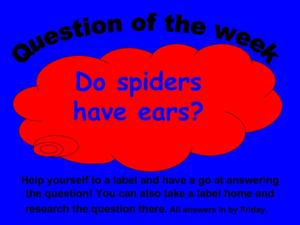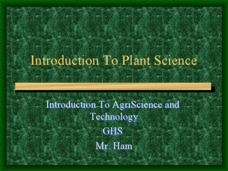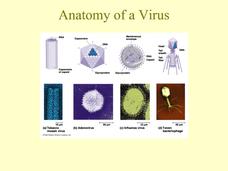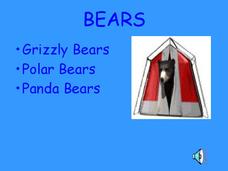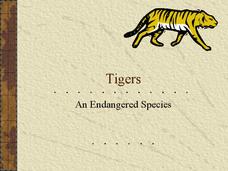Curated OER
The World of Living Things
The World of Living Things is the focus of this biology presentation. Students view a presentation which introduces them to cells, parts of cells, microorganisms, and simple vs. complex animals. They see that they are classified as a...
Curated OER
Question of the Week
Use this presentation as a means to spark discussion and promote critical-thinking skills in your classroom. Learners read and discuss a series of questions such as whether animals can talk. This presentation provides a good way to have...
Curated OER
Introduction to Plant Science
Although the formatting is less than perfect and some of the pictures are blurry, the information in this presentation on plants is pertinent. Viewers will be able to compare and contrast plants with animals. They will learn about...
Scholastic
Study Jams! Animal Life Cycles
Only five slides, but worth the while for introducing upper-elementary zoologists to different animal life cycles. Two types of metamorphoses are explained: complete and incomplete. Stunning photography flows before the eyes of the...
Curated OER
Collective Nouns
Collective Nouns are the focus of this early-elementary presentation. Pupils see many examples of collective nouns through pictures and text. Terrific interactive opportunities are embedded in the slides as well as a link to an excellent...
Curated OER
Hibernation
Explain the process behind animal hibernation. This text-rich presentation provides clear information related to weather, animal behaviors, and their coping mechanisms.
Curated OER
Animal Adaptations
This short, yet though-provoking, presentation is on how animals adapt to their environment. The question, "How have the following animals adapted to their environnment?" is posed on the second slide, then pictures of animals follow....
Curated OER
Australia
Studying Australia? Be guided on a virtual field trip exploring this country’s history, culture, native people, language, music, animals, and more. Use as an introduction to a unit on Australia or to prompt a writing assignment or class...
Curated OER
Aquaculture
There are many important facts about raising water animals commercially in this PowerPoint. Fish, alligators, crayfish and bullfrogs are considered, and the special conditions that each require is also included.
Curated OER
Reproductive Biotechnology
Your agriculture students will learn some of the techniques involved in the reroductive health of animals and manipulation of embryos. The details included here are somewhat sensitive and also very specific techniques for general students.
Curated OER
Animal Survival - Water and Waste
Here is a very simple set of slides to complement your lecture about the importance of water for animals. It includes a table of where we gain liquid from, the chemical reaction for aerobic respiration, how we lose water, and how ADH and...
Curated OER
Food Chains
This simple collection of slides depicts four different food chains, including one for a freshwater habitat. Ideal for primary science learners, the slides employ a combination of photographs and graphics of the sun, plants, and animals....
Curated OER
My New Pet
Young children love talking about their pets. This presentation has learners answer a series of questions about their pets. It would be a great way to kick off a lesson on pets, animals, and pet care. After addressing the series of...
Curated OER
Problem Solving: Division
A cute zoo theme sets the tone for a problem-solving activity which primes early learners for division. They separate zoo animals into equal groups and then write an equation that expresses the action.
Curated OER
Digestive System
The focus of this presentation is the digestive system of livestock animals. The simple digestive system of swine is compared to the complex digestive system of a cow. Details of the ruminant stomach are presented, complete with a...
Curated OER
Anatomy of a Virus
This PowerPoint summarizes details about the virus from the structure and reproduction methods to the different modes of infection. Various viral diseases of animals and plants, viroids, prions and genetic origins of viruses are...
Curated OER
Mountains
Explore the mountain habitat with this collection of slides. The climate is described, along with the associated plant and animal life. Some of the pictures are attractive, but some leave much to be desired. There is a generous amount of...
Curated OER
Growing Up
This two-part resource helps little learners understand the life cycle. They view images that show how various creatures change from infancy to toddlerhood. Pupils use a circle to draw any life cycle they wish, showing it in four major...
Biology Junction
Energy Flow in an Ecosystem
Every living thing requires a food source, thus the interconnections in ecosystems become complex. Scholars learn about these interconnections in a presentation on energy flow. It starts with the sun and moves through many different...
Reed Novel Studies
Hatchet
A brief introductory presentation illustrates many images from Gary Paulsen's Hatchet. From berries to black bears, young readers take a quick trip through Alaska during a class reading unit.
University of Maryland
Pollination
Sixteen ounces of honey requires more than 1,000 bees traveling over 100,000 miles and visiting 4.5 million flowers. The presentation includes sexual reproduction in plants, the parts and functions of a flower,...
Curated OER
Bears
The Grizzly, Polar, and Panda are all types of bears; they are also the topic of this informative presentation. Each slide contains numerous facts about bear habitats, food resources, and characteristics. Fun photographs, sound, and...
Curated OER
Tigers: An Endangered Species
Facts about tigers are packed into a PowerPoint presentation about tigers. The presentation includes great photographs and accompanying text regarding the habitats, diet, lifespan, and physical attributes of tigers. Very interesting!
Curated OER
Animal Skulls
Pictures of different animal skulls make this slide show fascinating. The intent is to display the differences in structure among herbivores, carnivores, and omnivores. If you do not have animal skull replicas, this presentation would be...
Other popular searches
- Farm Animals
- Zoo Animals
- Nocturnal Animals
- Prehistoric Animals
- Arctic Animals
- Jungle Animals
- Plants and Animals
- Desert Animals
- Animals and Their Habitats
- Oviparous Animals
- Classification of Animals
- Winter Animals

